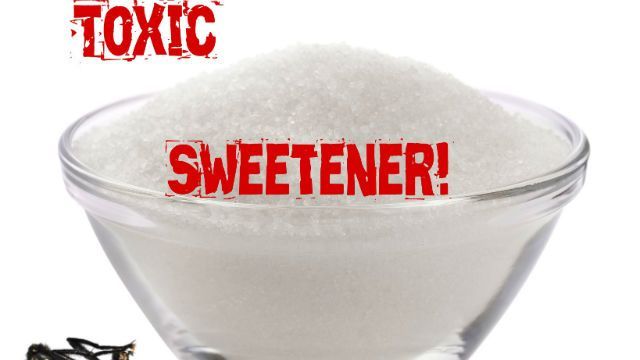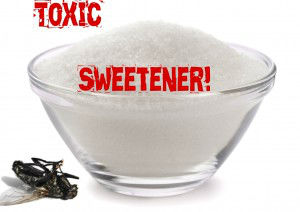
With the dangers of sugar consumption – obesity, diabetes, inflammation, the list goes on – becoming increasingly well-known, the market for sugar alternatives is booming. As more and more research has also come to light on the dangers of artificial sweeteners, many people are on the lookout for a natural sugar replacement.
However, when searching for these products, we need to be exceedingly careful to read the labels, as many contain not-so-natural additives. Many brands of so-called “natural” sweeteners contain processed and potentially harmful ingredients, even if they are based around a natural, healthy (in its raw form) ingredient, such as stevia.
One example of this is Truvia, a sweetener manufactured by the Coca-Cola Company that is marketed as natural. The star of Truvia’s ingredient list is rebiana, a processed form of stevia.
This, in itself, is a red flag, as a processed version of a plant rarely resembles the real thing. What’s more, a new study performed at Drexel University has found that erythritol, a sugar alcohol found in Truvia, actually functions as an insecticide.
According to the researchers who performed the study, the experiment originated three years ago as a science project that lead author Daniel Marenda’s son, Simon Kaschock-Marenda, performed in sixth grade. The younger Marenda set out to test the effects of sugars and sugar alternatives on flies, and found that the flies that were exposed to Truvia died rather quickly.
The science fair project evolved into a Drexel University study when the father-son pair teamed up with entomologist Sean O’Donnell. The study, which was performed on Drosophila melanogaster fruit flies, singled out erythritol as the killer ingredient.
The researchers found that the flies who ate Truvia as part of their diet lived for an average of 5.8 days, while the flies who ate foods with other sweeteners, and non-sweetened control group foods, lived between 38.6 and 50.8 days.
Interestingly, the researchers also observed that when given a choice, the fruit flies seemed to prefer Truvia to the other sweeteners, the very substance which killed them. The authors write, “ingested erythritol decreased fruit fly longevity in a dose-dependent manner, and erythritol was ingested by flies that had free access to control (sucrose) foods.” They add, “erythritol may be used as a novel, environmentally sustainable and human safe approach for insect pest control.”
While it may be safe for humans be around erythritol without experiencing the harm caused by exposure to common pesticides, it certainly deserves no place in our food. This sugar alcohol, approved for use in foods by the FDA in 2001, is commonly derived from GMO corn. Its main appeal to manufacturers is that it contains very little in the way of calories.
However, leading health expert Dr. Joseph Mercola explains that the low caloric content provided by sugar alcohols such as erythritol is due to the fact that the body cannot completely absorb them. Erythritol has also been linked to digestive disturbances, such as gas, diarrhea and stomach pain, as well as headaches.
These potential symptoms, coupled with the largely unknown health effects of eating a processed GMO derivative, and the new knowledge that it kills insects, mean that if you are concerned about your health, when it comes to erythritol, it is best to stay far, far away.
If you are looking for a truly natural alternative to sugar, check out the following three options. The key to remember is to check the label carefully when purchasing, even if it is organic. If it contains additives that you cannot pronounce, chances are they have no place in your body.
Whole leaf stevia
Stevia (Stevia rebaudiana), in its pure leaf form, is an amazing plant. It is native to South America, and has been used for hundreds of years to sweeten foods and beverages, as well as to aid in digestive distress and lower blood sugar and blood pressure. Although the leaves of the stevia plant are 30-40 times sweeter than sugar, they do not raise blood sugar levels.
To use, simply crush whole, dried, organic leaves and add to your favorite teas, desserts and more. You may also choose to grow your own stevia plants in a garden or window box. When the leaves are mature, all you have to do is pick the leaves, dry and enjoy.
Note: It is important to mention that in the Drexel University study, stevia, even the processed stevia extract, played no role in Truvia’s insecticidal properties. Another sweetener using the extract, which did not include erythritol, did not kill the fruit flies. However, we still advise against the extract and strongly recommend the real thing.
Organic coconut crystals
Organic coconut crystals are made from the nectar or sap of the buds of coconut tree flowers. They have a low glycemic index, and also provide the body with a range of B-vitamins, many essential minerals (including calcium, copper, magnesium, phosphorus, iron and zinc), and 16 out of the 20 amino acids. While it is important not to go overboard, these tropical crystals are a great choice for the occasional homemade dessert or for other treats.
Raw honey is nutrient-rich, sweet and delicious. It contains B-vitamins, vitamin C, and a host of minerals including calcium, potassium and magnesium. It also has been found to have antibacterial, antiviral and antifungal properties, and promotes healthy gut bacteria. We recommend Manuka honey, which hails from New Zealand and Australia, and has been linked to enhanced disease-fighting properties. However, do not feed raw honey to children under the age of one.
These three REAL sugar alternatives offer a wealth of both sweetness and nutrition, with which the processed imposters cannot even begin to compare.
-The Alternative Daily


